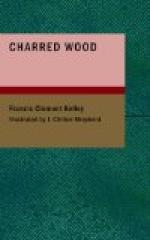Mark Griffin was silent. For some minutes not a word was exchanged between the two men. Then Mark arose and, without looking at his friend, said good night and left the room.
A minute later he returned.
“Father,” he said, “you are very hopeful about Ruth. I am trying to share your hope. If everything comes out right and she is not lost to me, will you—heretic or unfaithful son though I may still be, whichever you are pleased to call me—will you still be a friend and, should she accept me, join our hands?”
Father Murray walked over and put his hand on Mark’s shoulders.
“I am afraid, Mark, that it is again the Faith instinct. Of course I will marry you—that I expected to do. I could not be a mere onlooker to give her away. When you get her, Mark, you will get her from me, not only with an uncle’s blessing, but with another as strong as Mother Church can make it and as binding as eternity.”
CHAPTER XVIII
SAUNDERS SCORES
It lacked but five minutes to the hour of ten next morning when the card of the Minister’s secretary was handed to Father Murray. The priest sent down a polite request for the visitor to come to his room, and at once telephoned for Mark. Both men arrived at the same moment and were introduced at the door. Father Murray, at Saunders’ own request, kept the detective in the background. Saunders had, in the meantime, been learning all he could about the Ministry and its interior—“for emergencies,” he explained to Mark.
The secretary proceeded to business without delay.
“I have come on behalf of His Excellency,” he said, “and to express his regrets.”
“I scarcely expected regrets,” answered the priest; “for at ten o’clock I was to have a definite answer.”
“It is impossible, Reverend Sir, to give you that. His Excellency bade me offer full assurance that a definite answer will not long be delayed; but a somewhat unforeseen situation was found in Baltimore—a situation that was unforeseen by you, though rather expected by His Excellency.”
“I cannot imagine,” Father Murray spoke rather tartly, “what that situation could be.”
“Let me explain then.” The secretary talked as one sure of his ground. “I take it that neither Baron Griffin nor yourself, Reverend Sir, would be at all interested in the movements of the Grand Duchess?”
“Not particularly,” answered the priest.
“Then I am sorry to say that the dead girl in Baltimore is surely your niece. The other—”
“At the Ministry—” Mark put in.
“Wherever she is,” parried the secretary. “The other is the Grand Duchess.”
“Perhaps, Mr. Secretary,” quietly suggested Father Murray, “you will admit that I ought to know my own niece?”
“There is a great resemblance, Reverend Sir, between the two ladies. I have seen the dead girl, and have examined her belongings. Her apparel was made, it is true, in Paris; but your niece has recently been there. Her bag bears the initials, ‘R.A.’ The mesh bag is plainly marked in gold cut initials with the same letters. The dressing case is also marked ‘R.A.’ Even the handkerchiefs are thus marked.”




